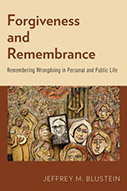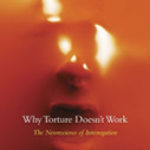Forgiveness and Remembrance: Remembering Wrongdoing in Public and Private Life

Author: Jeffrey M. Blustein
Publisher: New York; Oxford, UK: Oxford University Press, 2014. 352p.
Reviewer: Leo Zaibert | March 2015
Punishment is not the only possible response to wrongdoing. We can, of course, also forgive. Criminal justice systems are predominantly – if not exclusively – concerned with the former, punitive response rather than with the latter. After all, crime is a particularly grievous type of wrongdoing, and society needs to react to it in particularly decisive ways. But still, it is by no means clear that criminal law theory ought to be utterly uninterested in how some possible non-punitive reactions to wrongdoing may play out in the context of crime.
Jeffrey Blustein’s Forgiveness and Remembrance is as good a starting place as any if we wish to think about these non-punitive responses. As its title indicates the book fruitfully exploits both the connections between forgiveness and memory and it pays special attention to these connections in the public context – a focus of particular interest to criminal law theorists. Blustein’s book is replete with remarks to the effect that the standard philosophical approach to forgiveness is overly simple. One could perhaps quibble with Blustein’s homogenizing all different contemporary approaches under the single umbrella term, “standard approach”. But those would indeed be mere quibbles. There is no question that what Blustein gathers together under the umbrella term is at least the mainstream or orthodox position (even if dissenting voices also exist). Consider but a few instances, amongst many others, of what Blustein thinks are shortcomings of the standard account: its theory of value typically “distorts and oversimplifies the complexity of moral life” (253); it tends to flatten the “complex, multilayered, and fluid” emotional life of the forgiver (88); and it fails to engage with “the complexity of human nature” (253). Time and time again, according to Blustein, the standard account oversimplifies the phenomena under consideration. Not surprisingly, then, Blustein seeks to correct this situation, and to offer “a more complex psychological portrait of what is involved in the process of forgiving than the standard account provides” (104) – one which, in effect “muddies this picture” (88).
It is often wise to approach such ambitious and far-reaching indictments of the received wisdom on any given topic with a healthy dose of skepticism. For one could reasonably wonder about the likelihood that so many able thinkers have been so wrong for so long, until a lone indicter sets matters straight. This very trope lacks as much originality as verisimilitude. And yet, sometimes things really are like this. Blustein is thoroughly convincing – both when he diagnoses problems with the standard account, and when he suggests solutions. The result of Blustein’s efforts is a truly formidable book: ambitious, important, and very well thought-out.
I cannot address here all the different topics Blustein discusses. But I would like to focus on one: the relationship between forgiveness and retribution (or “retributive justice”). Blustein sometimes appear to assume too sharp a contrast between “forgiveness” and “retributive justice” (166). To be sure, that there is a contrast here is undeniable: to forgive is either (in the standard account) to forswear emotions that are appropriate to hold against the wrongdoer, or (in my view) to deliberately refuse to inflict the punishment that the wrongdoer deserves. On the other hand, precisely because as Blustein recognizes, moral life is complex, and because, as he also recognizes, such complexity points toward forms of value-pluralism, we should resist the temptation of assuming that retributivists need to always oppose forgiveness. What the retributivist asserts – in contradistinction to all sorts of utilitarian views – is that there is positive value in the suffering of the deserving. But she need not assert that this value ought to be pursued at all costs: sometimes this value is trumped by the value of sparing a wrongdoer some suffering (via forgiveness). So, the contrast is subtle.
While Blustein clearly is among those scholars who seek to broaden the scope of the emotions that are relevant for forgiveness, he may unwittingly have allowed his treatment of this topic to perpetuate the binary opposition that opposes retributivism (or “retributive justice”, etc.) to forgiveness. For, as we will immediately see, he makes a rather sharp distinction between retributive and non-retributive emotions: the former “aim to retaliate … whereas non-retributive negative do not” (63). Tellingly, Blustein also refers to the former as “angry”, “hostile”, “malicious”, and so on, whereas he reserves more positive descriptors for non-retributive emotions. By identifying the emotions of the opposite of forgiveness with such a witches’ brew of negative connotations, forgiveness may then indeed appear as inherently “measured”, “peaceful” “benevolent” and so on, and thus as an inherently good response to wrongdoing, or as an inherently better response than the retributive or hostile ones.
As he insightfully criticizes the standard account for simplistically assuming that once we forgive a wrongdoer, all of our resentment eo ipso disappears, Blustein offers a much more complicated – and much more compelling – picture of our emotional landscape. Blustein shows that there are many emotions at play here: not only resentment, but indignation, disappointment, and sheer sadness, among others. All of these Blustein calls “negative” emotions. When we forgive, our “emotional state predominantly characterized by negative emotions” is gradually transformed into an “emotional state characterized by a combination of negative and positive emotions or predominantly positive emotions” (94). Interestingly, however, Blustein makes a distinction between two types of negative emotions: the retributive and the non-retributive ones. And it is the non-retributive emotions that can coexist with positive emotions as the gradual process of forgiveness unfolds: “positive emotions,” he tells us, “may coexist with the non-retributive negative ones” (94-95, emphasis added). So, while Blustein’s take on the emotional landscape of the forgiver is much richer than the landscape presupposed in the standard approach he rightly criticizes, it similarly excludes retributive or hostile emotions. In so doing, Blustein may perhaps remain closer to the standard account than he may want.
My reaction to the standard account of retributivism is similar, in spirit, to Blustein’s reaction to the standard account of forgiveness. As I hinted at above, the best way to understand retributivism is to see it as a thesis about the value of deserved suffering. Retributivists believe that there is intrinsic value in wrongdoers getting the suffering that they deserve; this does not commit them to any retaliatory scheme, or to any system of criminal justice – since this value can be overridden by all sorts of other values. It only renders retributivism more ecumenical, more attuned to the complexity of human life than are their non-retributivist counterparts.
Blustein in fact admits that “retributive responses to wrongdoing may be legitimate responses that society should not seek to discourage” (166). But he immediately recognizes that this position “may seem to conflict” with his other views. Blustein solves this apparent conflict by suggesting that “retributive emotions have a somewhat different function and importance in transitional political contexts than in ordinary interpersonal ones” (166). Blustein’s strategy here is not nearly as compelling as the rest of his book. First of all, more is needed in order to argue for such difference between the political and the interpersonal. But, more importantly, an option that Blustein overlooks is that even in the impersonal context some retributive responses – and above all some retributive emotions – are not only legitimate, but in fact compatible with forgiveness: to emphasize that there is intrinsic value in deserved punishment is not to be committed to the view that this value ought always to be realized, at all costs.
Even if I am right that Blustein perhaps overemphasizes the tension between forgiveness and retribution, the spirit of Blustein’s book is on the right track, and it usefully bucks the trend set by the mainstream views – both regarding forgiveness and retribution. Blustein helps us see the complexity of the moral universe and the oversimplifications that tend to hold sway in the specialized literatures (on forgiveness and on retribution). One can suggest that criminal justice systems may perhaps be less punitive without thereby endorsing impractical abolitionist agendas or even denying the appropriateness of punishment in some cases. A virtuous punisher does not only feel satisfaction at seeing justice being served; she may also feel sadness for the suffering inflicted on the wrongdoer, and empathy with her plight. Books like Blustein’s help in directing our attention toward those sorts of considerations.
Leo Zaibert is Professor of Philosophy and Department Chair, Union College.
A longer version of this review will appear in the July 2015 issue of Social Theory and Practice.


